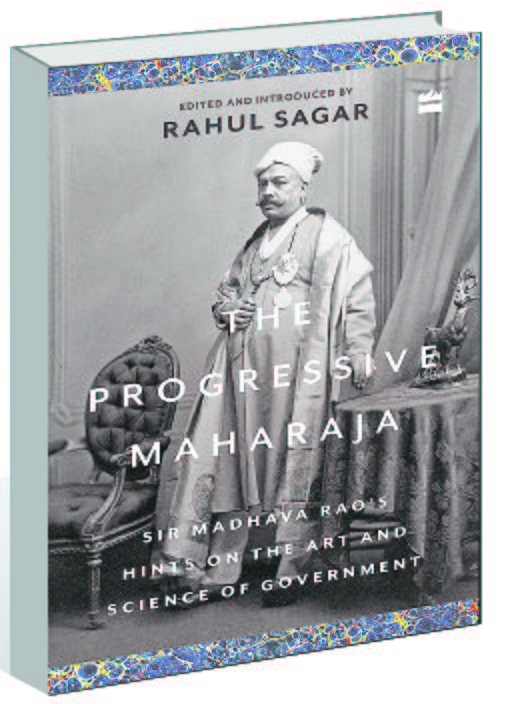The Progressive Maharaja: Sir Madhava Rao’s Hints on the Art and Science of Government by Rahul Sagar. HarperCollins. Pages 472. Rs 699
Book Title: The Progressive Maharaja: Sir Madhava Rao’s Hints on the Art and Science of Government
Author: Rahul Sagar
Raaja Bhasin
For all the supposition that my friends and I are ‘well-read’, every once in a while something comes along to shake that page-flipping sense of false accomplishment. Despite him being a towering political figure and statesman of the 19th century, in my little circle, none of us had heard of Sir Madhava Rao. And we certainly had no idea of his considerable achievements and remarkable discourses on governance and administration.
Unlike many of his better known contemporaries who served in the British-administered part of India, Rao served in the princely states. For some 25 years, Sir Madhava Rao successively served as the Prime Minister of three ‘native territories’: Travancore, Indore and Baroda. In the first two, vested cabals compelled him to leave, but not before he had initiated — and often completed — extensive financial, judicial and administrative reforms which continued to bear fruit long after he had left.
It was, however, in his third tenure, when he took over as the Dewan of Baroda, that his experience and knowledge came to fruition. In 1881, Sir Madhava Rao delivered a series of lectures on statecraft to the young Maharaja of Baroda, Sayaji Rao Gaekwad III. In these, he explained ‘how and why a Maharaja should combine raj dharma, the classical Indian ideal by which rulers should govern, with the ideals of limited sovereignty’.
These lectures took shape in Rao’s ‘Hints on the Art and Science of Government’, which may well be considered as the first (perhaps, only) extensive commentary on statecraft in India of that period. Somehow, posterity overlooked this remarkable man and his incisive treatise. A relatively unknown book titled ‘Lessons on Raja Neeti’ published in 2011 by M Rama Jois, a former Chief Justice of the Punjab and Haryana High Court, was based on Rao’s lectures. Interestingly, Jois mentioned that the book had been recommended to him by Prime Minister Narendra Modi when he was the Chief Minister of Gujarat, and he even penned the Foreword to Jois’ book.
Rahul Sagar, a professor of political science at New York University, Abu Dhabi, has done an admirable job of reclaiming Sir Madhava Rao from the shadows. In ‘The Progressive Maharaja: Sir Madhava Rao’s Hints on the Art and Science of Government’, Sagar notes that the book is an example of how the English-educated Indian elite sought to relook at ancient principles of statesmanship in a modern age, advising rulers to govern liberally and prudently. Taking a cue from Queen Victoria’s Proclamation of 1858, which marked the transfer of power from the East India Company to the Crown, Sir Madhava Rao echoed, “Let each native prince proudly say that in the prosperity of his subjects will be his strength, in their contentment his security, and in their gratitude his best reward.”
Sagar’s meticulous research and excellent introduction reclaim this little known statesman from the shadows. This is a book that should be in the library of every administrator and of every student of colonial India and its princes.














